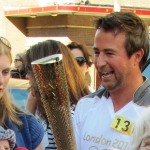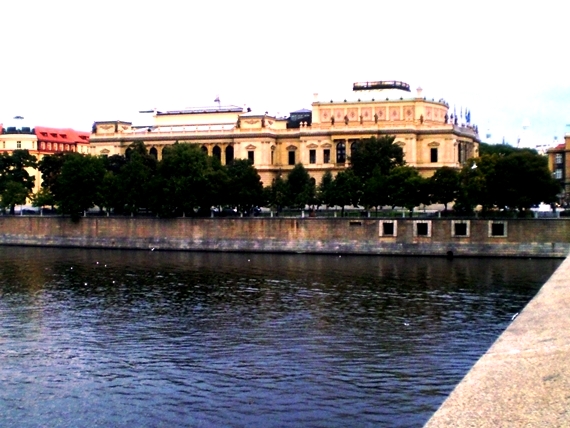Blog Archives
Liverpool’s Hope Street Celebrates The Queen’s Jubilees And The 2012 Olympics
 Hope Street in Liverpool has long been a place for celebrations.
Hope Street in Liverpool has long been a place for celebrations.
The street, deservedly famed for its music and theatre, links Liverpool’s two cathedrals north-to-south, and its universities and colleges, east-to-west. It is inevitable therefore both that the Queen should visit Hope Street many times – not least in 1977 for her Silver Jubilee – and that the Olympic torch should be paraded along Hope Street (today, 1 June) as part of its three month tour of the UK before finally reaching the 2012 London Olympiad.
Richard Gordon-Smith
 Richard Gordon-Smith is a composer, music animateur and violinist. Previously a member of the Royal Liverpool Philharmonic Orchestra, he now commits himself full-time to educational and community activities in schools and elsewherework, and to serious composition.
Richard Gordon-Smith is a composer, music animateur and violinist. Previously a member of the Royal Liverpool Philharmonic Orchestra, he now commits himself full-time to educational and community activities in schools and elsewherework, and to serious composition.
Prague, Forty Years On (And The Velvet Revolution)
 The events of the 1960s are simply history for many of us today, but a visit to Prague (September 2008) provides a reminder that for some, the memory of those events is still very much alive. The Czech Republic is now a vital, thriving and democratic country as a part of main-stream Europe, thanks to the Velvet Revolution of 1989. Yet there are plenty of Czech citizens who recall the trauma of those times as integral to their personal ‘lived experience’.
The events of the 1960s are simply history for many of us today, but a visit to Prague (September 2008) provides a reminder that for some, the memory of those events is still very much alive. The Czech Republic is now a vital, thriving and democratic country as a part of main-stream Europe, thanks to the Velvet Revolution of 1989. Yet there are plenty of Czech citizens who recall the trauma of those times as integral to their personal ‘lived experience’.
These thoughts became very focused for me today, when we took a walk around Prague with a citizen of that city, our good friend Dada. Our exploration began with a look at the gardens of the Czech Senate, which lie above the commercial centre of the city, simply designed yet formal and splendidly impressive all at once:
But as we wandered it became apparent that these were not just gardens; they were host also to an exhibition with more than token impact. For here before us was a real military tank….
And here too were notices about the objects on show, telling us (Dada explained) about the tragic events of forty years ago, in 1968: the failure of the Prague Spring which would have relaxed the grip of Communism, and the invasion of Czechoslovakia – as it then was – by Russia.
The reality of this invasion had hitherto been rather personally academic for most of us as individuals in (what was then) Western Europe; but here was a Czech citizen who had lived through it, explaining what it had meant to her, her family and her friends… and telling us how, later, these same people had been part of the extraordinary Velvet Revolution which was the basis of the transformation of the then-repressive Czechoslovakia into the present democratic state of the Czech Republic.
Mindful of these sobering thoughts, we left the graceful gardens and returned down towards the River Vltava, to the Dvorak Concert Hall (Rudolfinum) which had brought us to Prague, travelling with the Royal Liverpool Philharmonic Orchestra for their performances at the Prague Festival.
Outside the Hall was another exhibition of posters and photographs, relating the happenings of the invasion and its long aftermath.
In a way this felt surreal. Here we all were, discussing the events as history, but they had happened right where we stood, involving in critically personal ways people whom we knew as friends. For a while they had had no choice but to bear the crushing burdens of occupation stoically…
…. but eventually the protests grew to a great clamour, and after many long years, in 1989 the Velvet Revolution came about, mercifully without a huge toll of human life.
And amongst those leading this Revolution had been many writers and artists, including Vaclav Havel who was later to become the President of the Czech Republic, and his friend the musician Libor Pesek – a renown conductor who has had a long and close relationship with the RLPO, the Orchestra with which we were now visiting Prague.
Thus did the tale round upon itself. We stood there, in the heart of the Prague, testimony by our presence to the history and vibrancy of that great city, talking between ourselves as citizens of Europe and the world, and free to read, say and do as we wished.
No longer were the Prague Spring and the Velvet Revolution merely events on a timeline. They were instead vital elements of the spirit and understandings of real people, standing right next to us.
And that was something we pondered as we spent the evening in the Rudolfinum, hearing the RLPO concert which was the reason for our visit.
The concert, as we’d hoped, was a triumph; but, enjoying the music, we mused too that so much more so was the human spirit which had made it possible – the determination of a fiercely brave and proud people who, as we carried on our mundane existence in the democracies of Western Europe, had had to summon every ounce of endurance and strength to let the light of self-determination shine in their culturally blessed, historic city and homeland.
HOTFOOT Concert 2008 – Cafe Europe (Liverpool)
 HOTFOOT 2008, in Liverpool’s Philharmonic Hall on Sunday 7 September [NB: 7 pm], is the twelfth such annual concert. Promoted as ever by HOPES: The Hope Street Association, the theme for the city’s 2008 European Capital of Culture year is ‘Cafe Europe‘, with music devised by local children working alongside professional musicians from HOPES.
HOTFOOT 2008, in Liverpool’s Philharmonic Hall on Sunday 7 September [NB: 7 pm], is the twelfth such annual concert. Promoted as ever by HOPES: The Hope Street Association, the theme for the city’s 2008 European Capital of Culture year is ‘Cafe Europe‘, with music devised by local children working alongside professional musicians from HOPES.
Liverpool At Christmas
 The few weeks as 2007 ended and became 2008 saw much festive activity in Liverpool. Here, the set for the BBC’s special production of the ‘Liverpool Nativity’ was surrounded by excited onlookers well before the performance started, but alongside all the high technology Saint George’s Hall stood serene, just as it has for the past 150 years.
The few weeks as 2007 ended and became 2008 saw much festive activity in Liverpool. Here, the set for the BBC’s special production of the ‘Liverpool Nativity’ was surrounded by excited onlookers well before the performance started, but alongside all the high technology Saint George’s Hall stood serene, just as it has for the past 150 years.
Martin Anthony (Tony) Burrage
 Martin Anthony Burrage (‘Tony’) is a classically trained violinist, pianist, teacher and music animateur. After graduation from the Royal Academy of Music and the BBC Training Orchestra, in 1971 he joined the Royal Liverpool Philharmonic Orchestra, of which he remains a proud member. Founder Director of Ensemble Liverpool, Live-A-Music & Elegant Music, Tony is a keen chamber musician, committed to engaging audiences and to the work of black British composer Samuel Coleridge Taylor.
Martin Anthony Burrage (‘Tony’) is a classically trained violinist, pianist, teacher and music animateur. After graduation from the Royal Academy of Music and the BBC Training Orchestra, in 1971 he joined the Royal Liverpool Philharmonic Orchestra, of which he remains a proud member. Founder Director of Ensemble Liverpool, Live-A-Music & Elegant Music, Tony is a keen chamber musician, committed to engaging audiences and to the work of black British composer Samuel Coleridge Taylor.











